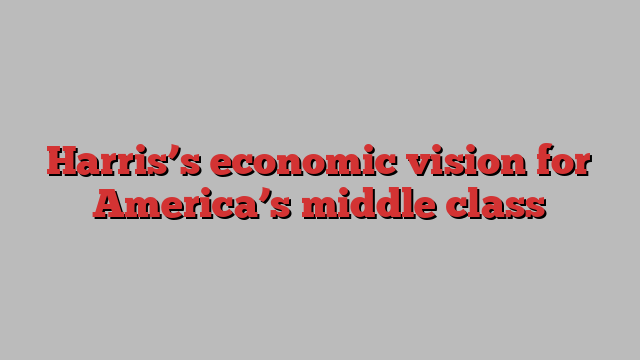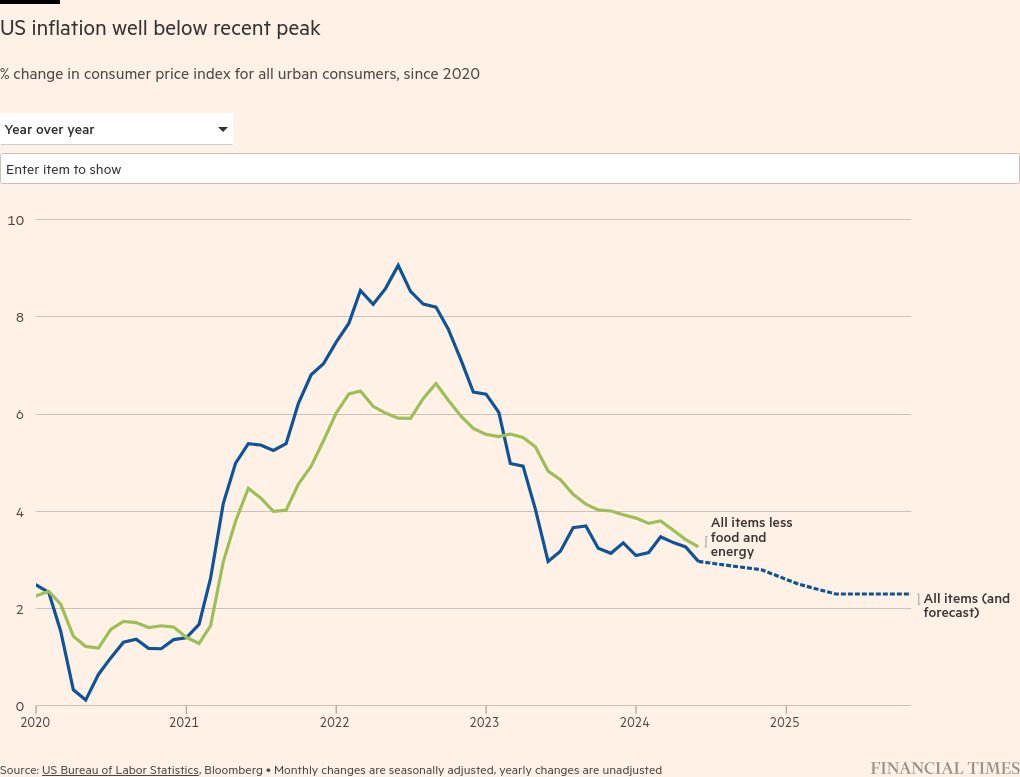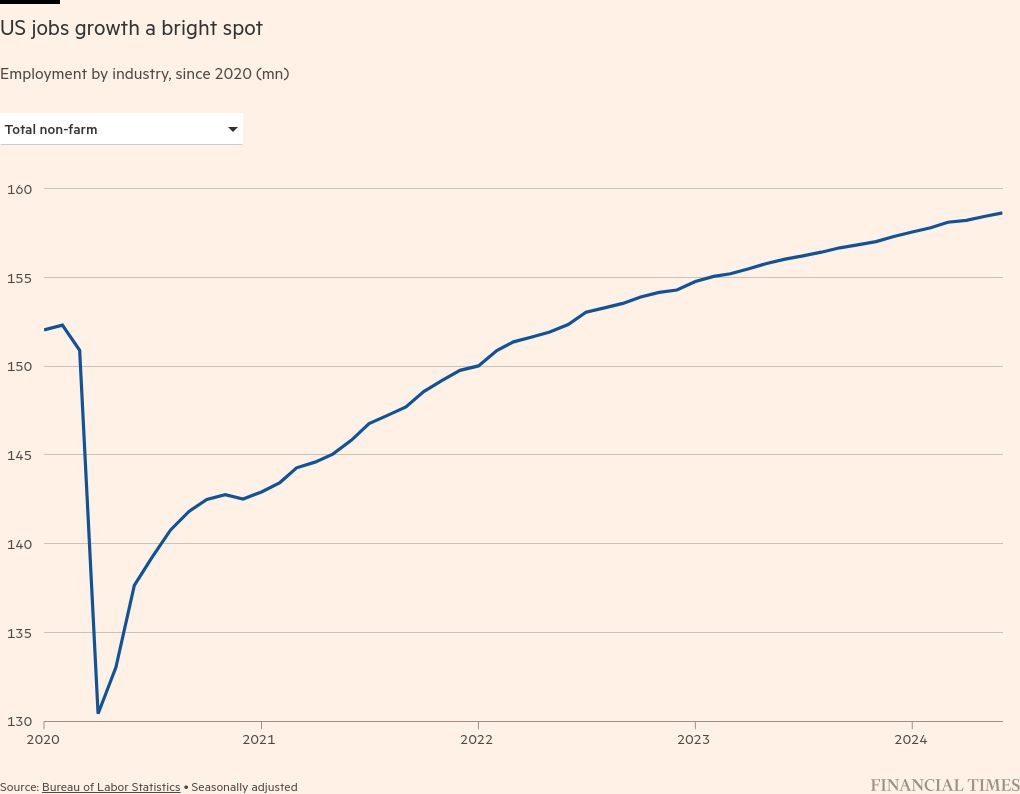
During her first week on the campaign trail, Kamala Harris wasted no time in laying out her economic vision for America’s middle class if she beats Republican rival Donald Trump in November’s US election.
“Building up the middle class will be a defining goal of my presidency,” she told a roaring crowd of voters at a high school gym in Wisconsin on Tuesday. “But Donald Trump wants to take your country backwards.”
The putative Democratic candidate is already embracing the most popular parts of Joe Biden’s plans and legislative achievements while drawing a contrast with Trump’s proposals — and hoping that she will be less tarnished than the president by the cost of living crisis that has unfolded in recent years.
Current and former Biden administration officials say Harris is expected to continue with Biden’s plan of investing in the country’s manufacturing sector, patching up infrastructure and incentivising green energy.
But she will also focus heavily, and possibly more forcefully, on the so-called “care economy”: increasing access to childcare, paid family leave and funding for education — plans that Biden was unable to get through Congress.
Perhaps most importantly, Harris may be a more effective defender of the Biden administration’s economic policies to American voters than the president himself in the face of relentless attacks from Republicans, including Trump, who blamed him for runaway prices.
Biden struggled to convince the public that they were better off under his stewardship despite navigating the US out of the worst economic contraction since the Great Depression and presiding over record jobs growth.

“Inflation took off under president Biden’s watch, so I think that people have a Pavlovian association,” said Ernie Tedeschi, the former chief economist at the White House Council of Economic Advisers who is now director of economics at the Budget Lab at Yale. He noted that this was not “entirely fair”.
But he added: “I think there is a real possibility that voters don’t blame vice-president Harris as much as they did president Biden.”
Harris, a former prosecutor and US senator from California, does not have a strong background in economics. As vice-president her main economic advisers have been Mike Pyle, a former BlackRock economist who recently served on the National Security Council at the White House and is now at Macro Advisory Partners, and Deanne Millison, who is now working on manufacturing policy at Ford Motor Company.
But Biden administration officials say she has mainstream centre-left views on economic policy that would probably show continuity with, rather than divergence from, Biden’s approach.
“I feel that the core values that have been reflected in the policies of this administration are ones that vice-president Harris deeply embraces,” US Treasury secretary Janet Yellen said during a press conference at the G20 summit in Brazil this week.
“She obviously supports middle class families, she knows that they are the key to America’s economic strength,” added Yellen. “She’s been focused on creating good jobs, lowering costs for Americans in crucial areas like child care and healthcare, training workers in industries of the future.”
The policies Harris is championing to boost the US social safety net were an element of Biden’s landmark 2021 $3.5tn Build Back Better plan but were excluded from its final passage through Congress.
“I could imagine a very short, punchy agenda made from the family-focused pieces of the Biden agenda that were in waiting for what we were expecting was going to be a second term,” said Tedeschi.
Ben Harris, formerly one of Biden’s top economic aides who is now at the Brookings Institution, said there was also scope for Harris to focus on housing, given her experience advocating for reduced rental costs during her time in the Senate.
That would extend work undertaken by the current administration, which has focused on housing-related issues in recent months. The White House recently announced a plan to cap rental increases nationwide and has allocated more funds to expand the supply of affordable housing.
Felicia Wong, who served on Biden’s transition advisory board and is now president of progressive advocacy group Roosevelt Forward, expects Harris to advocate more vigorously for American unions. One of the vice-president’s first rallies since becoming the de facto nominee was an event with members of American Federation of Teachers, the nation’s second-largest teachers’ union.
“One of the best ways to keep our nation moving forward is to give workers a voice: to protect the freedom to organise, to defend the freedom to collectively bargain, to end union busting,” Harris said at the event in Houston, Texas, on Thursday.

Harris’s biggest challenge will be to try to debunk the effort by Trump and the Republicans to cast themselves as the party of the working people, particularly in swing states.
She has already criticised Trump on policies that she says would harm working families, including tax cuts for wealthy Americans and corporations, across-the-board tariffs on imports and the mass deportation of immigrants. Harris is expected to stick to Biden’s vow not to raise taxes for anyone making less than $400,000 a year.
“Ultimately in November, there’s a choice for voters about two different pathways for the future,” said Bharat Ramamurti, the former deputy director of Biden’s National Economic Council. “The more focus that the campaign can put on the actual Trump agenda, the more I think they’ll be able to convince voters that that’s the wrong path.”
With inflation easing from its four-decade peak in 2022 and the Federal Reserve preparing to lower borrowing costs, an improving economic backdrop could allow the Harris campaign to tout the economic successes of the Biden-Harris agenda, while also creating optimism about her own plans for growth.
A recent survey led by Blueprint, a Democratic pollster, found that voters were evenly split between Harris and Trump when asked which candidate would do a better job bringing down prices on goods and services.
“There’s a chance to tell people the story of the economy and the recovery over the past few years with people in a more receptive mood,” said Ramamurti.